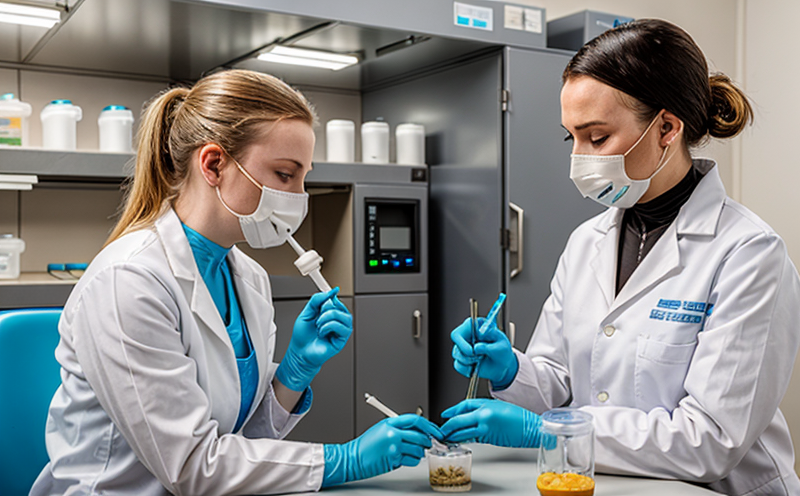AOAC 2022.04 Ergot Alkaloid Profiling in Rye-Based Foods
The AOAC Official Method 2022.04 provides a comprehensive approach to the analysis of ergot alkaloids in rye-based foods, ensuring that products meet regulatory and quality standards. Ergot alkaloids, including ergotamine, ergocristine, and ergometrine, are toxic compounds produced by fungi such as Claviceps purpurea. These toxins can contaminate grains like rye during the growing or storage phases, leading to potential health risks if consumed.
In rye-based food products, ergot alkaloids have been associated with various health issues including nausea, vomiting, and neurological symptoms. Regulatory bodies such as the European Commission and the United States Food and Drug Administration (FDA) have established limits for these toxins in rye-based foods to protect public health. The AOAC Official Method 2022.04 is designed to provide accurate and reliable quantitation of ergot alkaloids, ensuring compliance with these regulations.
The method employs liquid chromatography-tandem mass spectrometry (LC-MS/MS) for the analysis of ergot alkaloids in complex matrices such as rye-based cereals, breads, and flours. This advanced analytical technique allows for precise quantitation even in low concentration levels, making it a robust tool for monitoring and controlling contamination.
Sample preparation for this method involves several steps to ensure accurate results. Initially, the sample is ground into a fine powder using a mill or sieve. A representative subsample is then taken and extracted with a suitable solvent such as methanol-water mixture. This extract undergoes clean-up procedures like solid-phase extraction (SPE) to remove interfering compounds before injection onto the LC-MS/MS system.
The LC-MS/MS system used in this method operates under specific conditions optimized for ergot alkaloids, including column temperature, mobile phase composition, and ionization parameters. The method utilizes stable isotope-labeled internal standards to enhance accuracy and precision of measurements. Following analysis, the data are processed using specialized software to calculate concentrations of each ergot alkaloid present in the sample.
The AOAC 2022.04 method is recognized for its high specificity and sensitivity, allowing detection down to parts per billion (ppb) levels. This makes it particularly useful for monitoring low-level contamination that could otherwise go undetected by less sensitive methods. By adhering strictly to the protocol outlined in this official method, laboratories can achieve consistent and reproducible results across different samples and batches.
Compliance with international standards such as AOAC Official Method 2022.04 is crucial for ensuring that rye-based food products meet both regulatory requirements and consumer expectations regarding safety and quality. Regular monitoring using this method helps manufacturers maintain product integrity, protect their brand reputation, and ensure compliance with legal limits set by regulatory authorities.
For industries involved in the production, processing, or distribution of rye-based foods, implementing this method can provide significant benefits. It enables companies to proactively manage ergot alkaloid contamination risks, ensuring that their products are safe for consumption while also avoiding potential recalls and lawsuits. Additionally, adherence to this standard demonstrates a commitment to responsible business practices and upholds consumer trust.
In conclusion, the AOAC 2022.04 method offers an effective solution for detecting ergot alkaloids in rye-based foods, supporting both regulatory compliance and quality assurance efforts within food manufacturing facilities. Its use ensures that these products remain safe and consistent with established standards, thereby safeguarding public health.
Industry Applications
Rye-Based Cereals: This method is particularly relevant for companies producing rye-based breakfast cereals, which can contain ergot alkaloids if not properly managed during processing and storage.
Baked Goods: Manufacturers of breads, cakes, and other baked goods made from rye flour must ensure that their products do not exceed permitted limits of ergot alkaloids to comply with regulations.
Rye Flour Production: Processing facilities responsible for producing rye flour need reliable methods like AOAC 2022.04 to detect and control contamination throughout the production process.
In addition, this method is beneficial for food safety professionals who require accurate data on ergot alkaloid levels in various rye-based products to make informed decisions about quality assurance measures.
Eurolab Advantages
State-of-the-Art Equipment: Equipped with the latest LC-MS/MS systems, Eurolab ensures that all analyses are conducted using cutting-edge technology for precision and accuracy.
Experienced Technicians: Our team of highly trained analysts possesses extensive experience in conducting complex analyses like ergot alkaloid profiling, ensuring reliable results every time.
Certified Compliance: Eurolab is accredited to perform testing according to the AOAC Official Method 2022.04, guaranteeing that all tests meet international standards and are accepted by relevant regulatory bodies.
By leveraging these advantages, we provide clients with confidence in their test results, knowing they align perfectly with current best practices for ergot alkaloid analysis.
Why Choose This Test
Regulatory Compliance: Ensures that rye-based food products meet legal requirements set forth by regulatory authorities worldwide.
Risk Management: Identifies potential sources of ergot alkaloid contamination early, allowing for timely corrective actions to be taken.
Informed Decision-Making: Provides accurate data necessary for strategic planning related to product development and quality assurance programs.
Consumer Trust: Demonstrates a commitment to maintaining high standards of food safety, which is crucial in building lasting relationships with consumers.
Ethical Business Practices: By adhering strictly to internationally recognized methods like AOAC 2022.04, companies uphold ethical business practices and contribute positively to society.
Choosing this test not only ensures compliance but also contributes significantly to the overall quality of rye-based food products, ultimately benefiting all stakeholders involved in their production and distribution.





